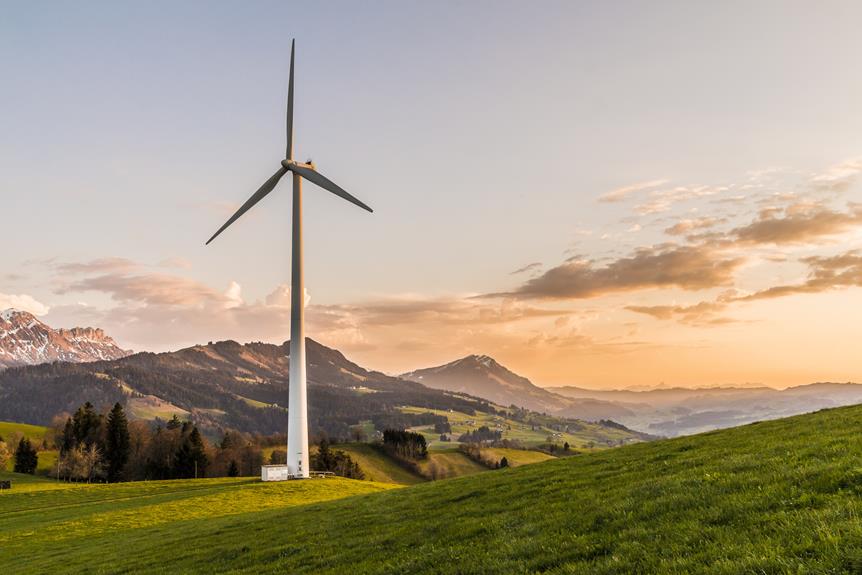What is smart energy system? How can we really harness the power of this type of energy for a greener world? Keep on reading to get the answer and learn more about this greener future solution.
With the global demand for sustainable energy solutions on the rise, the concept of smart energy has gained significant traction. In fact, solar energy has become a focal point in the pursuit of eco-friendly alternatives.
However, the current energy grid is ill-suited to accommodate the expansion of smart energy systems. In this article, we’ll be discussing the world of smart energy system. We’ll try to explore its benefits and provide valuable insights on how individuals can embrace this eco-friendly future.
Renewable Energy Types
Renewable energy types are increasingly gaining prominence as governments and industries worldwide recognize the importance of transitioning towards sustainable power sources. Understanding renewable energy types is crucial in order to fully grasp the concept of smart energy system and its role in creating a more environmentally-friendly future.
Smart energy solutions, such as solar energy and natural gas are key components of the smart grid. These renewable energy sources provide a more diverse power supply, reduce air pollution and emissions, and promote independence from traditional energy sources that harm the environment.
As governments prioritize smart energy, it is essential for individuals to educate themselves on the different types of renewable energy and the benefits they bring. By understanding renewable energy types, individuals can make informed decisions about their energy consumption and contribute to a brighter, eco-friendlier future.
Importance of Solar Energy
Solar energy plays a pivotal role in the transition towards smart energy, as it offers numerous benefits for a more sustainable and environmentally-friendly future. As one of the most talked-about forms of renewable energy, solar energy is easy to harvest due to the ubiquitous and free nature of sunlight. It is also the fastest-growing form of renewable energy in the United States, with countries worldwide joining the global effort to move towards solar energy.
The importance of solar energy becomes even more evident when considering the future of the energy grid. The current grid is outdated and cannot support newer forms of energy, but an overhaul is necessary to accommodate smart energy system. Experts predict that an increase in smart energy systems could overload the grid, highlighting the need for updating the electrical grid in coordination with the demand for smart energy.
The Current Energy Grid
The current energy grid is in need of a significant overhaul to support the growing demands of smart energy systems. As the transition towards renewable and sustainable energy sources accelerates, the existing grid infrastructure is becoming outdated and inadequate.
A smart grid is essential to facilitate the integration of smart energy technologies into the electricity supply system. It enables bidirectional communication between energy producers and consumers, allowing for better management of energy systems. By incorporating advanced sensors, meters, and automation, the smart grid can optimize energy distribution, improve reliability, and enhance efficiency.
Upgrading the grid is crucial to prevent overloads and ensure a seamless transition to a cleaner and more intelligent energy infrastructure that can meet the increasing demands of smart energy systems.
The Future of Energy Grid
To accommodate the growing demands of smart energy systems, an upgrade to the existing energy grid is imperative. The current energy grid is outdated and cannot support the newer forms of energy that smart energy focuses on. An overhaul of the energy grid is necessary to accommodate renewable smart energy sources.
Experts predict that an increase in smart energy systems could overload the grid if it is not updated. The explosion of renewable energy requires an update to the electrical grid, which should be coordinated with the demand for smart energy.
The future of the energy grid lies in the development of a smart grid, capable of efficiently managing the generation, distribution, and consumption of electricity. A smart grid utilizes advanced technologies such as sensors, automation, and digital communication to optimize the flow of electricity and improve reliability.
This grid will enable the integration of renewable energy sources, enhance grid resilience, and empower consumers to actively participate in energy management. The smart grid is a crucial component of the future of energy, enabling a more sustainable and efficient energy system.
Benefits of Diversified Power Supply
One of the key advantages of a diversified power supply is the reduction in reliance on traditional energy sources that harm the environment.
Smart energy systems promote a more diverse electricity supply by integrating various renewable energy sources such as solar, wind, and natural gas.
By harnessing power from these sustainable sources, smart energy system reduces air pollution and emissions that contribute to global warming.
The transition to a diversified power supply also fosters independence from traditional energy sources that deplete the earth’s resources and harm ecosystems.
Moreover, a diversified power supply is essential for the efficient and effective functioning of a smart grid. With a mix of renewable energy sources, the smart grid can optimize energy distribution and ensure a reliable and resilient electricity supply for communities.
Reducing Pollution With Smart Energy
Smart energy plays a crucial role in reducing pollution. By shifting towards renewable sources of energy, such as solar and natural gas, smart energy helps to minimize the harmful environmental impacts caused by traditional energy generation methods.
Traditional electricity supply relies heavily on fossil fuels, which contribute to air pollution and greenhouse gas emissions. In contrast, smart energy systems prioritize clean and sustainable energy sources, leading to a significant reduction in pollution levels.
Promoting Environmental Independence
Promoting environmental independence requires a shift towards sustainable energy sources. Smart energy plays a crucial role in achieving this goal. By leveraging renewable energy and reducing reliance on fossil fuels, smart energy promotes a cleaner and more sustainable future.
One key aspect of promoting environmental independence is the implementation of a smart grid. A smart grid allows for efficient management and distribution of electricity supply, optimizing energy usage and reducing waste.
This integration of smart energy technologies enables a more reliable and resilient energy infrastructure, capable of accommodating the increasing demand for renewable energy. By embracing smart energy, individuals and communities can reduce their carbon footprint, protect the environment, and contribute to a more sustainable and independent energy future.
Smart Energy and Climate Concerns
The impact of smart energy on climate concerns is significant and requires careful consideration.
Smart energy, with its focus on renewable sources, plays a crucial role in addressing climate change. By harnessing the power of solar energy, natural gas, and other non-depletable resources, smart energy provides a sustainable electricity supply.
The current energy grid, however, is ill-equipped to handle the increasing demand for smart energy. An overhaul of the grid is necessary to accommodate these newer forms of energy.
Furthermore, the switch to smart energy not only diversifies the power supply but also reduces air pollution and emissions that contribute to global warming.
Governments worldwide prioritize smart energy as a solution to climate concerns, promoting a brighter and eco-friendlier future.
Ensuring Home Insulation
A key aspect in maximizing energy efficiency is ensuring proper insulation in your home.
Proper home insulation plays a crucial role in reducing energy waste and maintaining a comfortable indoor environment. It helps to keep the cool air in during summers and the warmth in during winters, reducing the need for excessive heating or cooling.
Insulating your home not only contributes to a more sustainable and eco-friendly lifestyle but also helps you save on energy bills.
With the advent of smart energy and the smart grid, home insulation becomes even more important. Smart energy systems rely on an efficient and reliable grid to function optimally.
The Role of Smart Meters
Smart meters play a crucial role in optimizing the efficiency and functionality of smart energy systems by providing accurate and real-time data on energy usage. These devices are an integral part of the smart grid, which is a digitally advanced electricity supply network.
Smart meters enable the collection and transmission of energy consumption data, allowing consumers and utility companies to monitor and manage energy usage more effectively. By providing detailed insights into energy usage patterns, smart meters help consumers make informed decisions about their energy consumption, enabling them to reduce waste and save money.
Moreover, these devices facilitate demand response programs, where consumers can adjust their energy usage based on real-time pricing or grid conditions.
Financial Considerations for Solar Panels
To fully understand the financial considerations for solar panels, it is important to delve into the cost-effectiveness and long-term benefits of investing in this renewable energy solution.
Solar panels are a key component of smart energy systems, which aim to create a sustainable and efficient electricity supply.
When considering the financial aspects, it is crucial to evaluate the initial investment required for purchasing and installing solar panels, as well as the potential savings on electricity bills over time.
Additionally, it is important to consider any available government incentives or tax credits that can offset the cost of installation.
While the upfront cost of solar panels may seem high, the long-term benefits, such as reduced reliance on traditional energy sources and potential energy savings, make it a financially viable option for many homeowners and businesses.
Upgrading Outdated Appliances
The discussion from the previous subtopic carries over into the current subtopic of upgrading outdated appliances in the context of smart energy systems.
Upgrading outdated appliances is an essential step towards creating a more efficient and sustainable smart energy system. Smart energy relies on the integration of advanced technologies, such as smart grids, to optimize electricity supply and reduce energy waste.
Outdated appliances often consume excess energy, contributing to higher electricity bills and unnecessary strain on the grid. By upgrading to energy-efficient appliances, households can lower their energy consumption, save money, and support the transition to a smarter and greener energy future.
Additionally, upgrading outdated appliances aligns with the overall goal of reducing carbon emissions and promoting environmental sustainability.
Window Upgrades for Energy Savings
Upgrading outdated appliances in the context of smart energy systems leads us to the topic of enhancing energy savings through window upgrades.
Windows play a significant role in the energy efficiency of a building, as they can contribute to heat gain or loss. By upgrading windows, homeowners can improve insulation, reduce air leakage, and optimize natural lighting, resulting in substantial energy savings.
Smart energy systems, such as the smart grid, rely on efficient energy consumption to manage electricity supply effectively. Window upgrades can be a cost-effective way to achieve energy savings, as they can reduce the need for excessive heating or cooling, thus decreasing overall energy usage.
Investing in window upgrades not only benefits the environment but also contributes to a more comfortable and energy-efficient living space.
Global Trends in Smart Energy
Global trends in smart energy are shaping the future of sustainable power sources. As the world becomes more conscious of the need for environmentally-friendly solutions, smart energy is emerging as a key player in the transition to renewable electricity supply.
One of the significant trends in smart energy is the development of smart grids. These advanced systems use digital technology to optimize the generation, distribution, and consumption of electricity. By integrating renewable energy sources and enabling real-time monitoring and control, smart grids improve efficiency and reliability.
Another trend is the increasing adoption of smart energy systems worldwide. Governments and organizations are recognizing the potential of smart energy to reduce carbon emissions, enhance energy security, and create a more sustainable future. As global concerns about climate change continue to grow, the demand for smart energy solutions is expected to soar.
The Eco-Friendly Future With Smart Energy
Smart energy is paving the way for an environmentally-friendly future. With the increasing focus on renewable energy sources, such as solar and natural gas, smart energy is revolutionizing the way we generate and consume electricity. One key aspect of this transformation is the development of the smart grid, which is essential for accommodating the growing demand for smart energy.
The current energy grid is outdated and unable to support newer forms of energy, making an overhaul necessary. However, experts warn that an increase in smart energy systems could overload the grid, highlighting the need for a coordinated approach.
By embracing smart energy, we can diversify our power supply, reduce air pollution and emissions, and move towards a brighter, eco-friendlier future. Governments worldwide are prioritizing smart energy as they recognize the urgent need to address climate concerns.
To contribute to this eco-friendly future, individuals can save energy by ensuring proper insulation, using smart meters to monitor usage, considering solar panels, upgrading old appliances, and improving windows.
Conclusion
Smart energy system offers a sustainable and efficient solution to the world’s energy needs. By harnessing renewable sources like solar energy, we can reduce our reliance on traditional energy sources and mitigate environmental degradation.
However, the current energy grid must be upgraded to support the expansion of smart energy systems. By embracing smart energy and making energy-saving changes in our daily lives, we can contribute to a greener and more eco-friendly future.




